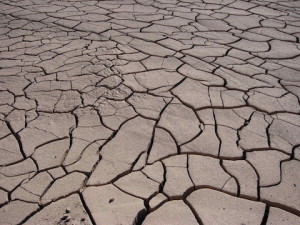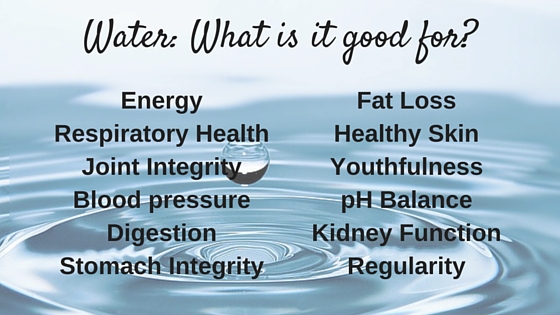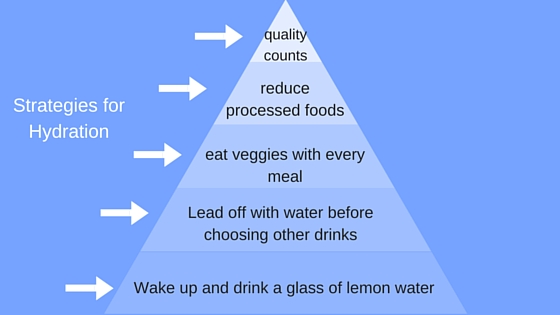How often are your lips dry? Are you an avid user of lip balm? Did you know that by the time you are thirsty, you are already dehydrated? Although severe or acute dehydration is somewhat rare, a surprisingly high percentage of the population is suffering from chronic dehydration.
Low grade, chronic dehydration can easily be missed if you don’t pay attention to details and it certainly hampers just about every function in the human body. After all, besides breathing air, water is the most necessary thing we intake for our well-being. It’s essential to survive but even mild depletion doesn’t allow you to thrive.

Why You Don’t Want To Suffer From Chronic Dehydration
In the spirit of Bruce Springsteen’s anthem “War“, I bring you… Water…what is it good for? Absolutely, everything. Say it again!
Here’s some specifics…
Energy: Low grade, chronic dehydration impairs enzyme activity, resulting in lower energy production. Even mild dehydration can cause a quicker onset of fatigue and interfere with athletic performance. While optimal hydration improves physical and mental energy and performance.
Respiratory Health: Similar to the stomach, the lungs and the rest of your breathing apparatus are reliant on hydration to keep a healthy level of mucus to protect against potentially irritating inhalants.
Joint Integrity: Chronic dehydration leads to greater wear and tear on the joints, cartilage and ligaments. Without enough hydration, they are more prone to inflammation and compression injuries.
Blood Pressure: Blood is mostly comprised of water and a shortage results in thicker blood. Thicker blood requires more tension to circulate so veins contract to allows this to happen. This creates higher blood pressure. Being hydrated keeps that tension at bay.
Digestion: While drinking water during or around meal time is less than ideal for digestion, not being hydrated will result in lower quantities of digestive juices. This impairs digestive function and the absorption of essential nutrients.
Stomach Integrity: Without enough hydration, stomach acids are harder on the lining membrane and this can lead to ulcers and discomfort. Drinking enough water will aid the mucous in the stomach in protecting against this.
Regularity: Being well-hydrated aids in passing waste in a timely and optimal way. If you are dehydrated, the body pulls too much water from the stool as it travels through the colon and this results in it being drier and harder. This contributes to constipation which in turn allows waste to remain in the body for too long. The impact of this is increased inflammation and toxicity.
Kidney Function: Poor hydration leads to poor kidney efficiency. Toxins that are usually flushed out in the urine stay in the body for longer. When you do eliminate them in your urine, they are more likely to cause issues in the urinary tract due to their concentration.
pH Balance: When you are well-hydrated the biochemical reactions in the body run well, preventing a build up of acidity in cells. Without adequate hydration, organs like the skin, kidneys and lungs are less effective at removing acids. Once again, this can lead to inflammation, the precursor to disease as well as the rise of other opportunistic organisms like fungus.
Fat Loss/Gain: As I mentioned in my last article, the hypothalamus is responsible for both notifying you of thirst and hunger. It becomes easy to confuse the two. Also, having low energy due to chronic dehydration can cause you to want to eat for a boost. This leads to overeating and added body fat. With the poor elimination caused by dehydration, a greater sustained toxic load also triggers more fat storage. Stay hydrated, stay, or get, lean.
Healthy Skin: Dry skin can be a result of not enough moisture, internal or external. Prolonged dry skin from chronic dehydration loses some of its elasticity. Lack of internal moisture also affects the fibroblasts and elastin in the dermis which can degrade your skin’s appearance and health. With inefficient toxin elimination caused by dehydration, more toxins can migrate through the skin through sweat. This can result in acne, rashes, and other irritations.
Youthfulness: For all the reasons listed above and for the basis of holistic vitality, chronic dehydration will age you prematurely and lead to feeling, looking and moving older than you need to. Stay hydrated, stay young and vital!

The prevailing myths that surround chronic dehydration
MYTH #1 – Dehydration mostly occurs after heavy exertion, very hot temperatures or water deprivation for days
Reality Check:
Most people might not be suffering from a life-threatening dehydration but chronic dehydration is widespread. Without conscious attempts to remain hydrated life will leave you in a state of low-grade, chronic dehydration.
The act of breathing, eating and of course, moving, all tap into your water supply. If you are low on hydration, you energy will be low as well. Beyond energy, you will also be more immune compromised and your outward appearance will also suffer. Over an extended period, chronic dehydration affects you at a cellular level too.
MYTH #2 – Drink 8 glasses of water a day and you’re good
Reality Check:
Constant hydration is key to optimal performance, however, that doesn’t mean you need to hydrate like a car gets an oil change. Drink water, sure. But also, consider you diet and activity level.
If you eat a good amount of fresh vegetables and fruit, you are getting hydration from there as well. If you eat a lot of processed and dried food, you’ll need to increase you water intake. It takes water to digest food and function, so an exact recommendation for everyone is silly.
Heavy exercise, environment (humidity, temperature) and what you eat and drink will change your water requirements. If in doubt, drink more but you don’t need to measure precisely.
MYTH #3 – A drink is a drink and would be as hydrating with any name
Reality Check:
While some recommendations say drink fluids, not all fluids are equal. Coffee, soft drinks, alcohol, and even protein drinks increase the water demands of your body. Go ahead and have those drinks (okay, maybe not all of them or too much of some) but don’t count them in your hydration tally.
I was in a state of chronic dehydration when I was working long hours in a corporate job. I would work out in the early morning and then have a post workout protein shake, followed by a coffee on the way to work and then another mid-morning as well. I started to feel a lot better by carrying around a water bottle and refilling it at least once a day.
MYTH #4 – Thirst is the best indicator of dehydration
Reality Check:
Being thirsty is actually a later stage of chronic dehydration. You can experience much more subtle signs that it’s time to rehydrate. Things like brain fog, a drop in energy, aches, and dry skin can all indicate you need more water.
Don’t wait, drink a glass to start the day and keep it up. Again, if you are a regular drinker of the beverages mentioned above, don’t wait to feel off to drink water. At least, match a glass of water to every cup of coffee, pop, alcohol or other non-hydrating drink.
MYTH #5 – Water is the cure for chronic dehydration
Reality Check:
Water is great. Drink it but to get hydrated and stay hydrated, you need a lot more. Getting the right balance of electrolytes and minerals will aid in water absorption and transportation. Afterall, you don’t just want the water to go through your digestive system. You need to get it into your cells, skin, and blood as well.
A quality diet with nutrient-rich foods, clean protein, lots of vegetables and healthy fats will contribute to integrating your water intake. Good salt, like sea salt or Himalayan pink salt not processed sodium or table salt, will provide the minerals needed for hydration to be successful.
MYTH #6: You’re hydrated if your urine is clear and copious
Reality Check:
While the color of your urine does indicate the addition of particles to the water leaving your body, having clear water is not ideal. Light yellow urine is something to be proud of. This would indicate that you have enough water in your system and you haven’t flushed out too many minerals by overconsumption of water.
However, darker yellow or smelly urine is a concern. I know, I know…you’re urine reeks after eating asparagus. That’s okay, keep eating asparagus. Actually, eat more. You may start liking the smell. But if your urine smells otherwise or is not a light yellow, drink more water. If you continue to experience this even after you are clearly (pun intended) well-hydrated then go get checked out.
MYTH # 7 – Too much water will leave you bloated and swollen
Reality Check:
The opposite is true. If you are retaining water, it is not from drinking too much. Water retention is related to other health concerns like toxicity, cardiovascular or hormonal issues, among other things. Deal with the underlying cause and don’t reduce your water.
In fact, drinking too little water and chronic dehydration signals the kidneys to hold on to water to compensate. When you are well hydrated, you will flush excess water effectively, if all other things are equal.
MYTH #8 – More water is always better
Reality Check:
While erring on the side of more is a good idea, unbridled enthusiasm for rapid overconsumption of H2O (in other words, drinking a lot of water too fast 😉 ) can lead to water toxicity. This is rare but can result in cellular damage and even death. There was a radio station water-drinking contest a few years back that resulted in a death.
Don’t drink to the point of discomfort and recognize if you are craving water, due to serious exercise, you need electrolytes as well. If you are thirsty all the time and on top of your hydration, then get to a doctor.
Strategies To Avoid Chronic Dehydration
- Wake up and drink an 8oz. glass of filtered water with a half lemon. Fill your water bottle and keep it going throughout the day by having it visible to remind you. Refill and repeat (check out these bottles Bree uses to keep her drinking throughout the day).
- Lead off with water before choosing other drinks, especially alcohol, coffee, and juices. You will drink less of these, save money, reduce the potential ill effects and feel better.
- Drink good quality water, mineral spring water, filtered water or “bubbly” water – as my daughters call it. It tastes better, hydrates better, is more satisfying and doesn’t come with the contaminants you can get from some tap water and even some bottled water.
- Liberally eat vegetables with each meal. They are nature’s rehydration strategies packaged with water and minerals to get the results you need. They also help alkalize the body, aid in being regular and improve your energy levels significantly. This will all result in better body composition.
- Reduce processed foods, table salt, and lunch meats. If you eat a whole food diet, you can afford to add salt to your food more than if you are eating packaged and processed “foods”. When you add salt, choose the right kinds – good quality sea salt, kosher salt, pink Himalayan salt.

Some people believe the next war will be fought over water. This should express the value of water, the vital importance of water to our survival and we should all be taking advantage of access to good water, if you are lucky enough to have it, to stay fully hydrated regularly.
Stay hydrated to role model for your kids. Stay hydrated to enjoy your spouse. Stay hydrated to be the best you. Now, raise a glass of good quality H2O and let’s toast to your health!
Let me know if you have any other suggestions for staying hydrated below.
References:
